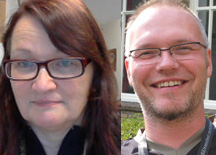Professional Competences of Music Therapists Working in Post-stroke Rehabilitation
DOI:
https://doi.org/10.15845/voices.v12i3.647Palavras-chave:
active music therapy, music listening, rehabilitation, strokeResumo
The aim of this qualitative study is to gain more insight into the skills and knowledge that music therapists feel they need in order to work successfully with people who have had an acute stroke. For this purpose, 6 music therapists were interviewed about their own particular specialist education. Another interview topic for them was to recount their subjective experiences of post-stroke rehabilitation work in hospitals and health care units, during the course of two projects: the Music Listening Project (=MUKU), which specifically used music listening during acute stroke rehabilitation; and the Active Music Therapy Project (=MT-STROKE), which used more active music therapy techniques. The interviews pointed to three key categories regarding the factors that are seen to affect clinical thinking: the first hinges on knowledge concerning the neurological basis of strokes; the second on patient interaction itself; and the third on the physiological and emotional aspects of music therapy. The results provide a better understanding of the tacit knowledge possessed by music therapists who work within Stroke Rehabilitation.
Downloads
Publicado
2012-10-02
Como Citar
Forsblom, A., & Ala-Ruona, E. (2012). Professional Competences of Music Therapists Working in Post-stroke Rehabilitation. Voices: A World Forum for Music Therapy, 12(3). https://doi.org/10.15845/voices.v12i3.647
Edição
Seção
Research Voices
Licença
Articles published prior to 2019 are subject to the following license, see: https://voices.no/index.php/voices/copyright

